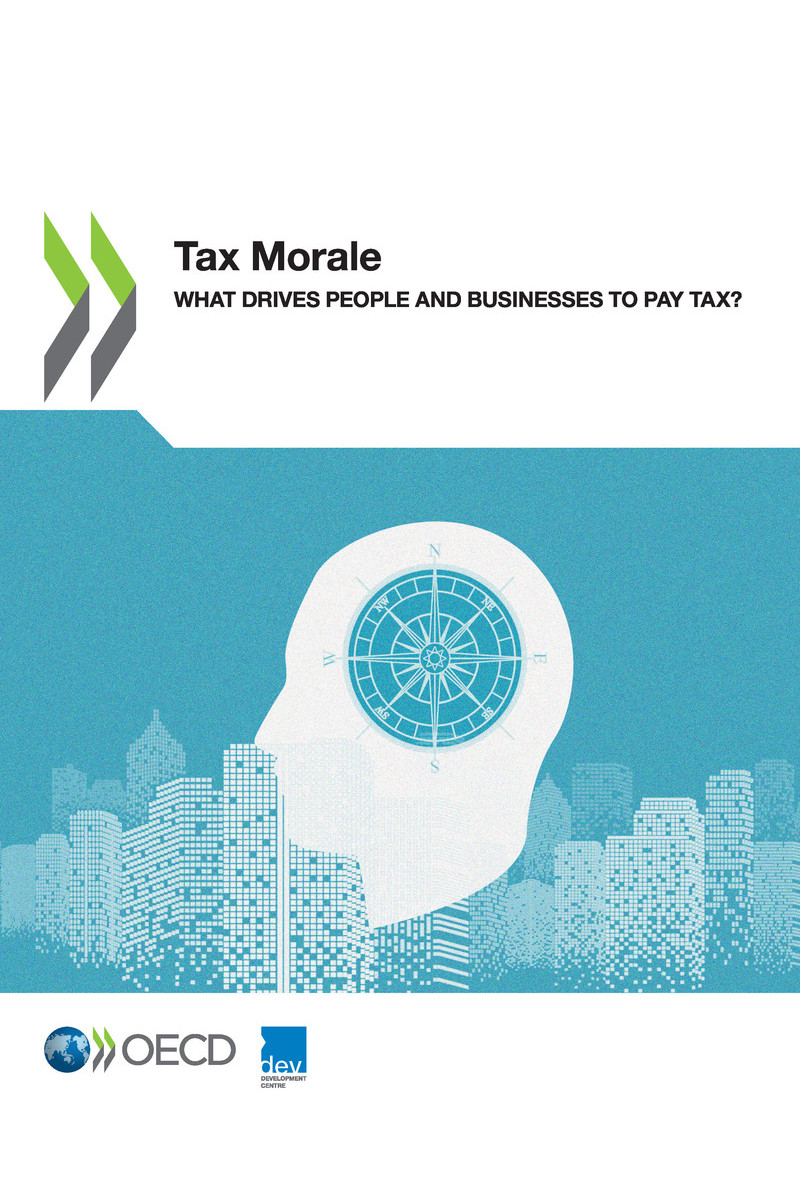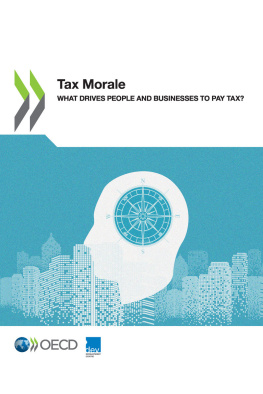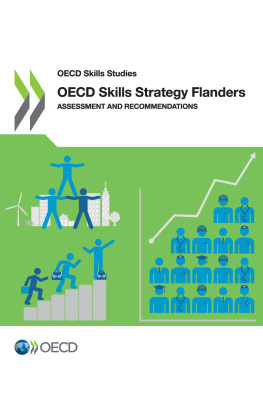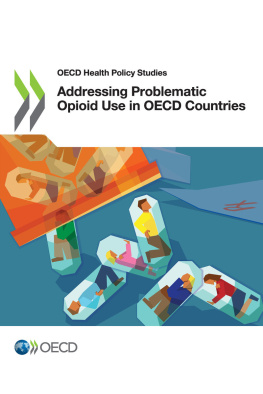OECD - Tax Morale
Here you can read online OECD - Tax Morale full text of the book (entire story) in english for free. Download pdf and epub, get meaning, cover and reviews about this ebook. year: 2019, publisher: OECD Publishing, genre: Politics. Description of the work, (preface) as well as reviews are available. Best literature library LitArk.com created for fans of good reading and offers a wide selection of genres:
Romance novel
Science fiction
Adventure
Detective
Science
History
Home and family
Prose
Art
Politics
Computer
Non-fiction
Religion
Business
Children
Humor
Choose a favorite category and find really read worthwhile books. Enjoy immersion in the world of imagination, feel the emotions of the characters or learn something new for yourself, make an fascinating discovery.
Tax Morale: summary, description and annotation
We offer to read an annotation, description, summary or preface (depends on what the author of the book "Tax Morale" wrote himself). If you haven't found the necessary information about the book — write in the comments, we will try to find it.
OECD: author's other books
Who wrote Tax Morale? Find out the surname, the name of the author of the book and a list of all author's works by series.
Tax Morale — read online for free the complete book (whole text) full work
Below is the text of the book, divided by pages. System saving the place of the last page read, allows you to conveniently read the book "Tax Morale" online for free, without having to search again every time where you left off. Put a bookmark, and you can go to the page where you finished reading at any time.
Font size:
Interval:
Bookmark:

OECD (2019), Tax Morale: What Drives People and Businesses to Pay Tax? , OECD Publishing, Paris, https://doi.org/10.1787/f3d8ea10-en .
A better understanding of what motivates taxpayers to participate in, and comply with, a tax system is valuable for all countries and stakeholders. Tax administrations can benefit from increased compliance and higher revenues, taxpayers (both businesses and individuals) are better served by tax systems that understand and are responsive to their needs, while increased data and discussion can help researchers deepen their understanding. In addition, such understanding can help organisations, such as civil society groups, improve communication on taxation, and development partners to maximise the impact of development assistance.
This report focuses on developing countries, where the importance of tax revenues for development has been highlighted by both the sustainable development goals (SDG) and the Addis Ababa action agenda (AAAA) on financing for development. Tax revenues are the largest source of financing for development, providing the funds governments need to invest, relieving poverty, delivering public services, and building the physical and social infrastructure for long-term development. Increasing tax revenues is therefore an essential goal for developing countries as they seek to raise the additional financing necessary to realise the SDGs.
Many developing countries face a range of challenges in increasing revenue domestically. These challenges may include a small tax base, a large informal sector, weak governance and administrative capacity, low per capita income, low levels of domestic savings and investment, and tax avoidance and evasion by firms and elites. As a result, two-thirds of least developed countries still struggle to raise taxes equivalent to more than 15% of GDP, the widely accepted minimum to enable an effective state. In comparison, OECD member countries raise taxes, on average, close to 35% of the gross domestic product (GDP).
There has been significant progress in recent years, especially in international taxation . Developing countries and development partners alike have been increasing their efforts to support domestic resource mobilisation (DRM). Most notably, signatories to the Addis Tax Initiative have committed to fostering DRM through increased transparency, fairness, effectiveness and efficiency of tax systems, while donors have committed to doubling the amount of support to DRM capacity building. At the international level, new tools, standards and approaches have been agreed, providing new options for all countries. By implementing the Base Erosion and Profit Shifting (BEPS) Actions, (15 measures to tackle tax avoidance, improve the coherence of international tax rules and ensure a more transparent tax environment) governments can enhance their ability to tax Multinational Enterprises (MNE), while improvements to exchange of information offer a range of benefits, especially in taxing high net worth individuals (HNWI).
There remains much to do in building a sustainable taxpaying culture. While the majority of individuals in developing countries will pay indirect, and perhaps informal, taxes, the number of registered taxpayers who file and pay taxes in most developing countries is very low. In addition, a proliferation of tax incentives to businesses, combined with opportunities for aggressive tax planning, have increased the challenge of raising tax revenues from businesses.
An increased focus on tax morale provides a route to increase voluntary compliance. Research shows a significant correlation between tax morale, generally defined as the intrinsic motivation to pay taxes (Torgler, 2005 [24] ) . Thus, a better understanding of what drives differences in tax morale is a key element in explaining variations in tax compliance. It also offers an alternative, grassroots perspective on tax systems, to more traditional administrative and quantitative measures, such as tax-to-GDP ratios.
Tax morale is composed of several, interlinked, elements. One approach to understanding these interlinkages is proposed by the World Bank. The World Bank theory of change for tax compliance (See ) (World Bank, forthcoming) highlights the dynamic relationships between trust, facilitation, and enforcement, and their role in building tax morale. The theory posits that trust is driven by the degree to which the tax system, including the approach to facilitation and enforcement, is characterized as fair, equitable, reciprocal, and accountable. As such, strengthening tax compliance is not only about improving tax enforcement and enforced compliance, but also about pursuing quasi-voluntary compliance through building trust and facilitating payments all underpinned by a credible, fair and equitable system of enforcement. For instance, a more service-oriented approach, rather than an enforcement approach, has helped the Swedish tax authorities to increase citizens trust in government, tax morale and thus tax compliance.

Based on empirical analysis, this report seeks to further the debate on tax morale, including to identify potential policy responses and options for future research . It does not seek to provide definitive answers, but rather to identify a number of areas which may benefit from further consideration, either as part of the policy making process, or through further research. The report uses the latest available data samples to bring new evidence to the understanding of tax morale. It is structured in two chapters. Chapter 1 focuses on the tax morale of individuals, using micro-econometric analysis of public opinion surveys at the global (World Values Survey) and regional levels in Africa, Asia and Latin America (See Annex A). The analysis allows the identification of the socio-economic factors and institutional perceptions that may affect tax morale in developing countries, as well as the testing for evidence of the fiscal contract influencing tax morale. Chapter 2 looks at the tax morale of businesses. It reviews the limited existing literature on tax morale for businesses. It then uses tax certainty as a proxy for tax morale of MNEs relying on survey data from over 500 companies operating in over 80 developing countries to identify some of the potential drivers and impacts of tax morale in MNEs.
Font size:
Interval:
Bookmark:
Similar books «Tax Morale»
Look at similar books to Tax Morale. We have selected literature similar in name and meaning in the hope of providing readers with more options to find new, interesting, not yet read works.
Discussion, reviews of the book Tax Morale and just readers' own opinions. Leave your comments, write what you think about the work, its meaning or the main characters. Specify what exactly you liked and what you didn't like, and why you think so.



















